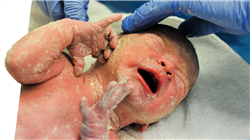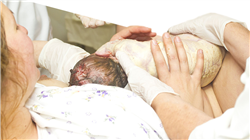University certificate
The world's largest faculty of nursing”
Description
In a constantly advancing field, keeping up to date is an essential task for professionals. Enroll in this Postgraduate diploma and get up to date immediately"

TECH has identified the most current factors involved in the neuroscientific study of Natural Childbirth and has brought them together in this incredible Postgraduate diploma that is focused on providing education in a didactic way, in which its participants acquire an update on the theoretical concepts related to this clinical procedure.
In this way, students will receive a wide range of advanced knowledge about the latest scientific advances in the biological changes that occur during the process of Natural Childbirth, as well as the reactions that the newborn has. In addition, it will delve into the new protocols to be followed at the time of assisting this type of procedure and the most modern implements that must be available in this situation.
This will be achieved through a Syllabus that has been developed by the best experts in this field and who are also part of the faculty responsible for this program. In this way, you will learn about the new research that has been carried out on the brain changes that occur during pregnancy and childbirth. In addition, medical interventions during this process and their effects will be discussed in depth.
Thanks to the Relearning method, students will have the opportunity to complete the study plan 100% online, without time constraints and from the comfort of their homes. In this way, they will be able to access at any time of the day to multimedia resources that clearly explain all the topics of the program. In addition, students will be able to hone their problem-solving skills by examining case studies that simulate real-life situations.
Update your knowledge with this Postgraduate diploma in a practical way and according to your personal and professional needs"
This Postgraduate diploma in Scientific and Neuroscientific Evidence on Natural Childbirth for Midwives contains the most complete and up-to-date scientific program on the market. The most important features include:
- The development of case studies presented by experts in Scientific and Neuroscientific Evidence on Natural Childbirth for Midwives
- The graphic, schematic and practical contents with which it is conceived
scientific and practical information on those disciplines that are essential for professional practice - Practical exercises where self-assessment can be used to improve learning.
- Its special emphasis on innovative methodologies
- Theoretical lessons, questions to the expert, debate forums on controversial topics, and individual reflection assignments
- Content that is accessible from any fixed or portable device with an Internet connection
This Postgraduate diploma contains the most complete and up-to-date educational program on the market in the field of Natural Childbirth"
The program’s teaching staff includes professionals from the industry who contribute their work experience to this program, as well as renowned specialists from leading societies and prestigious universities.
Its multimedia content, developed with the latest educational technology, will provide the professional with situated and contextual learning, i.e., a simulated environment that will provide immersive education programmed to learn in real situations.
This program is designed around Problem-Based Learning, whereby professionals must try to solve the different professional practice situations that arise throughout the program. For this purpose, the students will be assisted by an innovative interactive video system created by renowned and experienced experts.
This program will allow you to analyze simulated cases, which will provide an immersive and didactic learning experience"

Learn at your own pace and without the need to travel to a study center"
Syllabus
The contents that form part of the academic itinerary of this program have been performed by the best experts in this field. In this way, students will be able to study in depth the scientific evidence that demonstrates the neuronal reactions that occur during the process of Natural Childbirth. In addition, this syllabus also has multimedia resources that explain in detail the evidence related to this clinical procedure and the essential elements about the actions to be taken before the mother gives birth.

Get up to date on the latest scientific analysis on Natural Childbirth and expand your knowledge in this field"
Module 1. Natural Childbirth
1.1. Natural Childbirth
1.1.1. Science versus Dogma
1.1.2. Evolution as a Species
1.1.3. Statistics in the World: Oxytocin, Analgesia, Episiotomies, Caesarean Sections
1.1.4. Improving Statistics
1.2. Normal Childbirth in the Human Species
1.2.1. Hormone Cocktail in Normal Childbirth
1.2.2. Positions in Normal Childbirth
1.2.3. Female Sexuality
1.2.4. Physiology of Sexual Intercourse
1.3. Childbirth in Ancestral Cultures
1.3.1. Childbirth among the Taínos, Guanajatabeyes, and Siboneyes
1.3.2. Childbirth before the Sumerians
1.3.3. Orgasmic Childbirth
1.3.4. Michel Odent
1.4. Emotional Needs of Laboring Women
1.4.1. Empowerment
1.4.2. Privacy
1.4.3. Delivery
1.4.4. Majesty
1.5. Needs of the Professional Attending Laboring Women
1.5.1. Secrecy
1.5.2. Professional Attitude Towards Pain
1.5.3. Respect for the Majesty of the Moment
1.5.4. Privilege
1.6. The Reasons for Emotional Needs
1.6.1. Comfort
1.6.2. Privacy
1.6.3. Connection with the most Primal
1.6.4. Connection with the most Spiritual
1.7. Oxytocin
1.7.1. The Hemato-Placental Barrier
1.7.2. The Blood-Brain Barrier
1.7.3. Endogenous Oxytocin
1.7.4. Exogenous Oxytocin
1.8. Current Pandemics
1.8.1. The Cesarean Pandemic
1.8.2. The Immunological Disorders Pandemic
1.8.3. The Autism Pandemic
1.8.4. The Hyperactivity and Attention Deficit Pandemic
1.9. Newborn Needs
1.9.1. Intestinal Flora
1.9.2. Skin Flora
1.9.3. The Umbilical Cord
1.9.4. Placental Blood
1.10. Interventionism
1.10.1. Amending Nature
1.10.2. Intervening Calls for Intervention
1.10.3. The Chain of Interventionism
1.10.4. Environment and Safety in Childbirth
Module 2. Scientific and Neuroscientific Evidence
2.1. Neuroscience of Pregnancy and Motherhood
2.1.1. Brain Plasticity During the Transition to Motherhood
2.1.2. Comparison of Studies in Animals and Humans
2.1.3. Evolution and Biological Mechanisms of Maternal Care
2.1.4. Hormones and Their Role in Motherhood
2.2. Animal Models in Maternity Research
2.2.1. Brain Changes in Animals During Pregnancy and Offspring Care
2.2.2. Hormones and Regulation of Maternal Behavior in Animals
2.2.3. Applications of Animal Findings to Human Research
2.3. Brain Changes in Human During Pregnancy and Postpartum
2.3.1. Brain Reorganization During Pregnancy
2.3.2. Limbic System and Mother-Child Connection
2.3.3. Social Cognition, Empathy, and Maternal Adaptations
2.4. Clinical Implications and Practical Applications
2.4.1. Impact of Breastfeeding and Care on Caregiver's Brain
2.4.2. Neurobiology of Breastfeeding
2.4.3. Clinical Approach to Behavioral Changes in Motherhood
2.5. Oxytocin and Its Role in Bonding
2.5.1. Oxytocin in Humans
2.5.2. Oxytocin in Babies
2.5.3. Oxytocin in Maternal Care
2.6. Scientific Evidence in Pregnancy Monitoring
2.6.1. Nutrition in Pregnancy
2.6.2. Diabetes Screening
2.6.3. Weight Gain
2.6.4. Initial Immunization
2.7. Evidence-Based Delivery Care Practices
2.7.1. Labor Monitoring
2.7.2. Non-Invasive Technology
2.7.3. Analgesia and Anesthesia
2.8. Evidence-Based Intervention I
2.8.1. Large Babies
2.8.2. Prolonged Pregnancy
2.8.3. Rupture of Membranes
2.9. Evidence-Based Intervention II
2.9.1. Oxytocin IV
2.9.2. Fetal Distress
2.9.3. Labor Induction
2.10. Evidence-Based Intervention III
2.10.1. Cord Cutting
2.10.2. Delivery
Module 3. Delivery Preparation
3.1. Pregnancy Anatomy and Physiology
3.1.1. Changes in the Maternal Body
3.1.2. Fetal Development
3.1.3. Hormonal Process
3.1.4. Preparation for Labor
3.2. Stages of Labor
3.2.1. First Stage: Dilatation
3.2.2. Second Stage: Expulsion
3.2.3. Third Stage: Delivery
3.2.4. Fourth Stage: Recovery
3.3. Relaxation and Breathing Techniques
3.3.1. Deep and Controlled Breathing
3.3.2. Visualization Techniques
3.3.3. Massages and Muscle Relaxation Techniques
3.3.4. Mindfulness and Meditation
3.4. Prenatal Exercises and Physical Preparation
3.4.1. Muscle Strengthening
3.4.2. Flexibility and Mobility
3.4.3. Specific Exercises for Childbirth
3.4.4. General Physical Activity Recommendations
3.5. Nutrition during pregnancy
3.5.1. Specific Nutritional Needs
3.5.2. Recommended and Not Recommended Foods
3.5.3. Weight Control
3.5.4. Vitamin and Mineral Supplements
3.6. Birth Plan Development
3.6.1. Personal Preferences
3.6.2. Pain Relief Methods
3.6.3. Birth Positions
3.6.4. Contingency Plans
3.7. Interdisciplinary Collaboration in Childbirth Care
3.7.1. Role of Each Professional in Childbirth Care
3.7.2. Development of Clinical Skills in Childbirth Care
3.7.3. Childbirth Care in Interdisciplinary Teams
3.7.4. Leadership Skills in Obstetric Care
3.8. Emotional Preparation for Childbirth
3.8.1. Managing Fear and Anxiety
3.8.2. Emotional Support from the Partner and Family
3.8.3. Coping Techniques
3.8.4. Emotional Connection with the Baby
3.9. Childbirth Preparation for High-Risk Patients
3.9.1. Identification and Management of Risk Factors
3.9.2. Medical Planning and Follow-Up
3.9.3. Specific Interventions and Care
3.9.4. Emotional Support and Additional Resources
3.10. Family Involvement in Childbirth Education and Preparation
3.10.1. Family Involvement in Childbirth Education and Preparation
3.10.2. Prenatal Classes and Joint Educational Activities
3.10.3. Preparation for Emotional and Practical Support
3.10.4. Adaptation and Family Roles in the Postpartum

Take advantage of the learning approach that this program offers and study all the contents in a didactic way”
Postgraduate Diploma in Scientific and Neuroscientific Evidence on Natural Childbirth for Midwives
+The field of midwifery has undergone a significant evolution in recent years, driven by the growing demand for evidence-based practices and neuroscientific approaches to natural childbirth. At TECH Global University, we have developed the Postgraduate Diploma in Scientific and Neuroscientific Evidence on Natural Childbirth for Midwives program, with the objective of providing professionals with the necessary tools to offer quality care based on up-to-date knowledge.
In this Postgraduate Diploma program, knowledge of the most up-to-date scientific evidence related to natural childbirth will be deepened, allowing midwives to keep abreast of research and advances in this field. In addition, the neuroscientific underpinnings that support the physiology of childbirth will be addressed, providing midwives with a deeper understanding of the processes involved and enabling them to provide appropriate support to women during labor and delivery.







